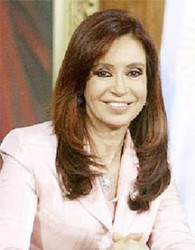BUENOS AIRES, (Reuters) – Argentine President Cristina Fernandez is reversing some of the populist policies that defined her first six years in power and will have little choice but to stick to the new, more pragmatic path over the remaining 20 months of her final term.

Confronted by falling dollar reserves, a weak economy and high inflation, Fernandez has in the past three months cut heating gas subsidies and let the peso devalue by 18 percent.
She has revamped shoddy official inflation reporting and agreed to pay Spain’s Repsol $5 billion for the 2012 nationalization of oil company YPF.
Investors long put off by Fernandez’s antagonism toward big business are interested in Argentina again and hoping that more prudent government spending could bolster reserves and slow one of the world’s highest inflation rates.
The policy changes have helped fuel a 19 percent rise in Argentine stocks so far this year and a 9.5 percent rally in local bonds that analysts expect will continue through mid-year.
If Fernandez’s government follows up with more changes it could put the economy on firmer ground for whoever succeeds her as president late next year. All of the most likely candidates have more orthodox economic policies than those pursued by Fernandez.
The more she cuts subsidies and allows the currency to devalue, the less painful the reform process will be after she leaves office.
“What’s not clear is whether she wants to do a full fiscal adjustment or just what’s necessary to get through her term without a crisis,” said Mariel Fornoni, a pollster with the Management & Fit consultancy.
Up until late 2013 Fernandez vowed to never devalue the peso or adjust fiscal policy, saying “that way lies chaos.”
Her government is playing down the recent policy shift and refuses to say what might come next.
Asked by Reuters this week how far the reforms will go, Economy Minister Axel Kicillof, a Marxist academic, shot back: “In the first place, there have been no reforms. We are not committed to specific policies, but to specific goals … such as increasing production, employment and the income of our citizens while decreasing inequality.”
“These objectives support internal demand and the export sector … which in turn benefits foreign companies operating in the country,” he said, abruptly ending a news conference.
Some business leaders are convinced the government has no choice but to move further away from the economic model of the last few years.
“We saw quite a few policy changes in the first quarter and expect to see more, including more devaluation of the currency, because they don’t have a choice,” said an executive with a foreign company with more than a billion dollars invested in Argentina, but who asked not to be identified.
“They held off for a long time, but now they are running out of money and need foreign investment,” the executive said.
POPULISM’S RISE AND FALL
\Since winning the presidency in 2007, Fernandez has used central bank reserves to finance heavy government spending. That worked while there was plenty of money coming in and Argentina’s economy was still rebounding from its 2002 sovereign default.
But inflation is now running at around 30 percent, growth is weak with many analysts expecting a recession by the end of this year, and central bank reserves are down more than 30 percent over the last 12 months to just $27.7 billion.
“Argentina’s problems start and end with its loose fiscal policy,” said Patrick Esteruelas, sovereign strategist at London-based hedge fund Emso, which has $2 billion under management.
He said the government will be helped by an expected record soy harvest over the next two months, and that it could take extra pressure off reserves if it follows the recent policy changes further spending cuts, including a reduction in electricity subsidies.
“The soy harvest provides a window of opportunity for the government to continue taking more aggressive corrective measures ahead of the negative seasonality of the second half,” Esteruelas said. “The jury is out as to whether they will use this window of opportunity adequately.”
Energy and transportation subsidies last year amounted to 5 percent of gross domestic product. Generous state spending had bolstered Fernandez’s popularity and helped her easily win re-election in 2011 but economic woes started hitting her popularity over the last two years.
Her approval rating has dropped to around 25 percent, according to a recent Management & Fit poll. That slide and growing fears of a new economic crisis were key factors behind the recent policy changes.
Fernandez is barred by law from seeking a third term in the October 2015 election, and she has not yet thrown her support behind any of the likely candidates.
Possible candidates include Buenos Aires Governor Daniel Scioli, a Wall Street favorite, and Sergio Massa, a former mayor of Buenos Aires suburb Tigre who has put battling inflation at the top of his agenda.
The election line-up has fueled optimism of deeper and longer-term policy changes aimed at boosting investment, especially in the potentially huge Vaca Muerta shale oil and gas field in Patagonia.
Chevron Corp last week doubled down on its investment in Vaca Muerta, saying it and YPF plan to spend an extra $1.6 billion on new wells and exploration projects.

